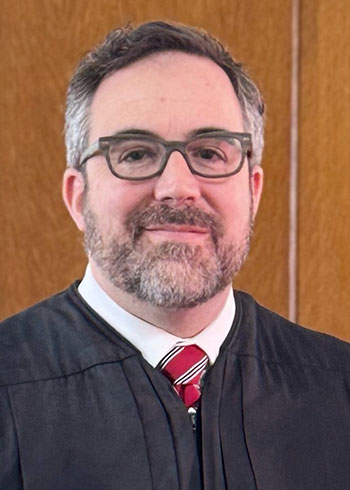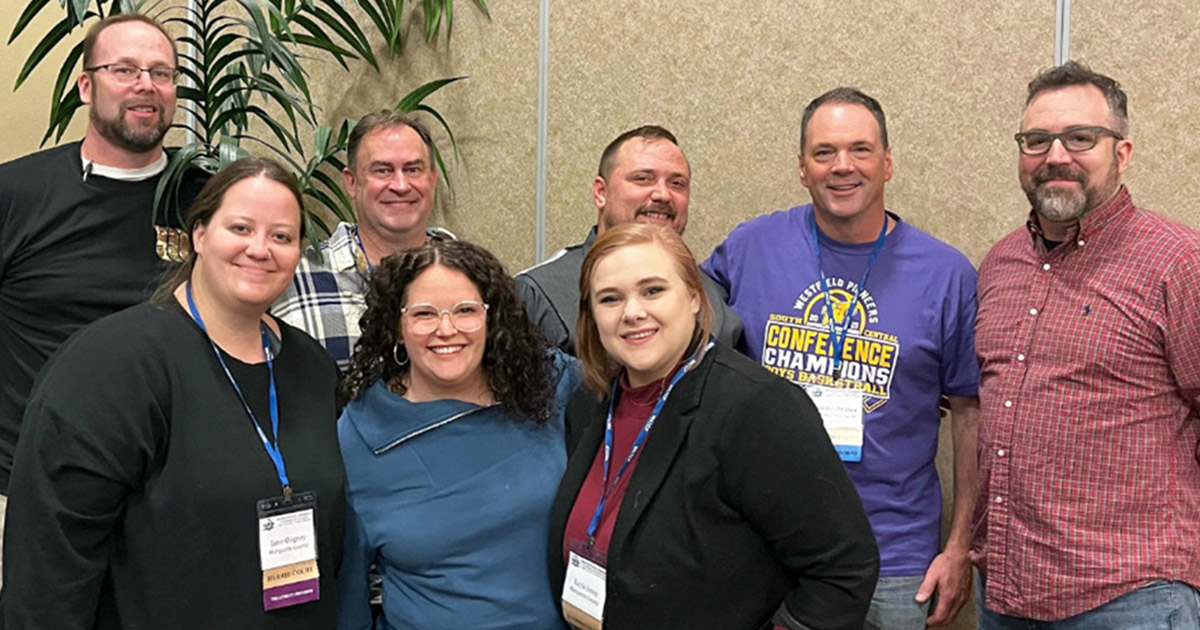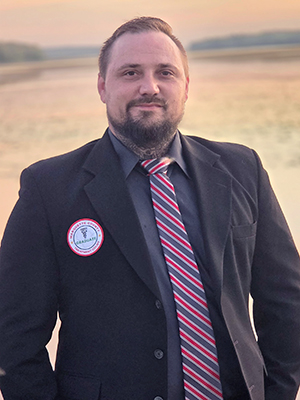
May 14, 2025 – Judge Chad Hendee is helping reshape justice in Marquette County, guiding a treatment court program that emphasizes accountability, support, and meaningful community connection. His leadership is earning national recognition.
Judge Hendee is the recipient of the State Bar of Wisconsin Bench and Bar Committee's
Judge of the Year Award. The award recognizes an outstanding circuit court judge who has improved the judicial system during the past year through leadership in advancing the quality of justice, judicial education, or innovative programs.
Judge Hendee's work has been recognized throughout Wisconsin as a model for ensuring success of treatment court graduates and engaging communities in this important effort.
"He has created a recovery community in Marquette County that enfolds participants and provides continuing support for graduates," said his nominator.
A Path to the Bench
Hendee grew up in Berlin, Wisconsin, and graduated from Ripon College in 1997 with a double major in history and political science. "I had an idea I may want to go into law – by junior year for certain," he says. His late uncle, Kirby Hendee – an attorney and lobbyist who served in the Wisconsin Senate – was a strong influence, even if he warned him against the profession. "He tried to convince me not to – he said I was too nice."
After graduating from U.W. Law School in 2000, Hendee went into private practice at a small firm in Baraboo. A year later, he joined Sauk County as assistant corporation counsel and later as an assistant district attorney in 2007.
In 2011, Governor Scott Walker appointed him district attorney of Marquette County. Eight years later, Hendee successfully ran for the circuit court bench. "I've had the good luck of never having a contested race," said Judge Hendee. He was recently elected to a second term.
The Treatment Court in Marquette County
In 2011, when Hendee became the Marquette County district attorney, the court's drug treatment court program was already in place, launched by Judge Richard Wright (who served 1995-2013) and continued by Judge Bernard Bult (2013 to 2019). "It had been going a couple of years by the time I got there," Judge Hendee said.
 Shannon Green is communications writer for the State Bar of Wisconsin, Madison. She can be reached by
email or by phone at (608) 250-6135.
Shannon Green is communications writer for the State Bar of Wisconsin, Madison. She can be reached by
email or by phone at (608) 250-6135.
As the county's district attorney, Hendee became passionate about treatment courts. "It is truly a program that has the ability to hold participants accountable and make sure those who do bad things have consequences, and it protects the public," he said. "I realize we can't use jail or prison to solve all of our problems, because if you do and a person truly has a substance abuse issue, they will come out of jail or prison with the same problem."
"The hope is that if you can affect one person's life and change the way they are able to fight against addiction, it can greatly affect the entire community – the defendant, their family, the people around them, the victims, and others affected by the crimes that come from that person's substance abuse."
Prisons are absolutely necessary, he said. "They can be the best thing for public safety and some level of deterrence." But "we have to recognize that there's also a better way to do this."
"The more I experience treatment court, the more I see that these people are struggling. No one says they want to be addicted to a substance. If they are given the tools and ability to fight that fight with the assistance of a group of professionals, that has value to it," he said.
The reality, of course, is that "there will be failures." But in watching what treatment court can do – watching participants' transform their lives and that of their families, "it's pretty amazing," he said.

Marquette County's Treatment Court Team includes, front row from left: Jane Oligney, Treatment Court Substance Abuse Counselor; Alice Schlotte, Treatment Court Coordinator; Kayla Jones, Probation and Parole Agent. Back row, from left: Mark Gumz, State Public Defender; Clifford Burden, Marquette County District Attorney; Logan Robertson, Peer Support Specialist; Scott Johnston, Chief Deputy, Marquette County Sheriff’s Office; Judge Chad Hendee.
The county's program is a hybrid court, covering participants with OWIs and with substance abuse disorders. Each participant is evaluated before they are admitted to the program, with the treatment court team assessing whether the program will offer a benefit to them. "There's a lot of collaboration that happens. The team wraps around this person to help them where they are struggling – this is much better than everyone operating in their own silo. We're all on the same page," Judge Hendee said.
The program averages 12 to 15 participants at any given time. The program typically lasts 18 months, but sometimes through a participant's violations, that time is extended to as many as 24 months.
"Some do fail and are discharged out of the program," Judge Hendee said.
'They Had Doubts at First'
The most successful component of the program evolved over the time Hendee was district attorney and then judge. The idea came from a national treatment court conference then-DA Hendee attended in 2012. It involved law enforcement check-ins for all participants.
The idea required buy-in from the deputies and the sheriff. At first, there was doubt from both sides, but that changed as the program got underway. Their support "has been incredible," Judge Hendee said. "We were asking them to think of the participants in a different way than how they were trained. It takes some real strength to do it."
Instead of an enemy, the officer became a source of support for a participant. It is often the first time in a participant's life they have placed any amount of trust in law enforcement.
"A lot of them spent their lives running from law enforcement. Now they begin to see that the deputies aren't out to get them," he said. "And the officers are able to see that these are real people with real problems. They aren't the 'bad guys' but someone who may struggle at times and need help."
Judge Hendee interviewed participants and deputies in a video he uses in his presentations. Deputies said they went from "what do I talk about with them?" to realizing that the participants are dedicated to moving their lives forward.
They get to see the participants grow and overcome their struggles. "You get to see them turn their life and their family's life around," said one deputy in the video. "Our goal of being a cop is to help people, and that's the goal of this program."
Participants in the video admitted they were reluctant at first, not thrilled about the idea, thinking that the deputies were there to catch them doing something wrong. "I got over it quickly," one said.
Through positive interactions – meeting and talking together – their relationships grew and became close. One participant said his goal was to show officers that "there's good people inside of those drug addicts, and if you do the work, you can see some change in them – and it's an amazing situation."
"From a 'lock them up and throw away the key' approach, the officers now attend events held by the participants and are an active part of their life. These relationships continue after a participant's graduation," wrote his nominator.
"It truly is a supportive interaction," Judge Hendee said. It's been fun to watch some of them becoming friends."
Word has gotten around about the success of the check-in program. Judge Hendee received an award from the Wisconsin Association of Treatment Court Professionals.
He and members of the Marquette County Treatment Court team will speak May 29, 2025, at the national All Rise conference – covering addiction, mental health, and justice reform – about enhancing law enforcement engagement in treatment courts.
It's the Small Things
More changes came after Hendee became judge in 2019.
Marquette County had a lack of housing for those in the program, so the program was able to use two homes where participants can stay for a reduced rent.
"He brought on an AODA counselor specific to the program when he learned that Marquette County Human Services would not provide counseling when a participant obtained insurance from a new job. He wanted to ensure that getting a job did not eliminate a participant's access to counseling," wrote his nominator.

Treatment Court Peer Support Specialist Logan Robertson, a graduate of the program, models his alumni jacket.
Seeing that participants were struggling to find jobs in this mostly rural county, program team members approached employers in the area. "On paper, they don't look like someone you'd want to hire," Judge Hendee said. With reassurance that the participants were monitored and tested regularly, "we were able to bridge those concerns."
Another special event for participants and alumni are the ceremonies for those graduating the program. An offhand comment in court about giving them "Hall of Fame type jackets" prompted Judge Hendee to look into getting jackets with patches celebrating their treatment court victories – which he did at his own expense.
"They didn't let me forget about it," he said with a laugh. His wife, attorney Natalie Bussan, designed patches for the graduates, found jackets in good shape at the local thrift store, and "I ironed them on."
Now, the program alumni proudly wear their jackets at each participant's graduation. "They do a procession with the jackets. It's our way of honoring our people who have made it through the program and continue to do well," he said.
Periodically, program alumni, participants, the deputies, and treatment court team members gather for events like softball games, Christmas parties, and an annual picnic.
Judge Hendee always attends. Many bring their families. "It's a great interaction that shows participants they can have healthy interactions with people outside the court setting. They get to see that the judge, the deputies, and district attorney are real people," Judge Hendee said.
"The way we do it [the treatment court] works very well for us. We're a very small county with not a lot of resources, but because of our size, we can also do things a little differently perhaps than larger counties," he said.
"This man is making such a difference in the participants' lives," wrote one person who nominated Judge Hendee for Judge of the Year.
Celebrate these Leaders in the Law Making a Difference
They are members of the legal community who make a difference – by living a lifetime of service, mentoring others, offering their pro bono services, and going the extra mile. Congratulations to these award recipients, all leaders in the legal profession.
Read on...
These award recipients will be honored in person at the Member Recognition Celebration during the
State Bar Annual Meeting & Conference, June 18-20, in Madison.
